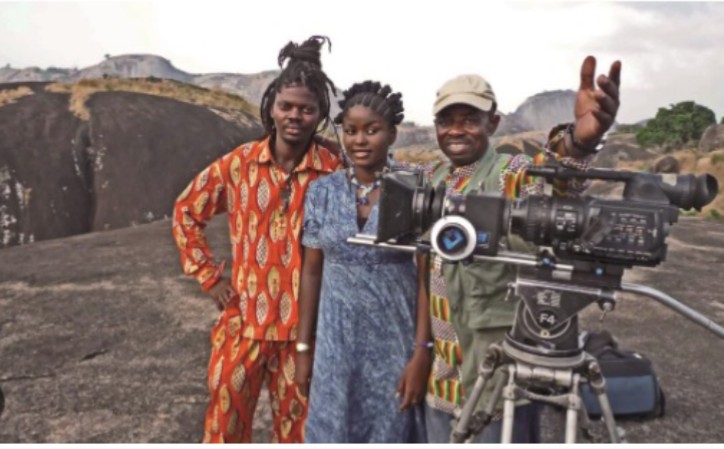Nollywood, the Nigerian film industry, is the offspring of decades (even centuries) of African storytelling, oral traditions, and theater performance. And under British colonial influence, it gradually evolved into modern cinema. Backed with improved financing, latest technology gadgets, and contemporary movie themes, Nollywood continues to advance impressively – both locally and worldwide.
Today, Nollywood is the second-largest movie industry across the globe (after Bollywood). It is reputed to produce more than 50 movies every week as of 2023. Again, Nollywood is reported to currently have a total net worth of more than 6.4 billion US Dollars (2023 statistics).
It is also one of Nigeria’s largest employers of labour – accounting for at least one million direct and indirect workers, if not more. Without any doubt, many local and global celebrities have also been groomed by Nollywood. The likes of Genevieve Nnaji, Richard Mofe-Damijo, Pete Edochie, Sola Sobowale and scores of others are notable examples.
Nollywood’s Historical Origins
The Nigerian film industry was birthed out of the indigenous traveling theater groups, who modeled their performances around native folklore and satire. They were particularly common amongst the Yoruba tribe of the southwest in pre-independence Nigeria.
These native actors and actresses were strongly influenced by the Christian missionaries, from whom they learnt basic acting skills. Hubert Ogunde was the actual pioneer of the traveling theater as far back as 1946. Later on, the likes of Ola Balogun, Duro Ladipo, and Moses Olaiya (amongst others) set up their own acting troupes.
Additionally, the post-colonial era saw the invention of celluloid films around the 1970s. Film making within that era often enjoyed funding by foreign investors and the Nigerian government. However, film production was very costly; and the distribution networks were not well developed. As such, the pioneer film makers (namely Hubert Ogunde and Ola Balogun) had only marginally evolved from the travelling theater. They had limited exposure and success.
The Nigerian movie industry progressed at a fairly slow pace over the years, up until 1992 when Kenneth Nnebue stepped in. Nnebue was a trader in Lagos, with an excess of blank videotapes. He thought of putting them to use, rather than wasting them. And so he decided to invite Chris Obi Rapu to produce a film named ‘Living in Bondage‘. Copies of the movie were cheaply stored and sold off in video cassettes. It achieved significant success.
Nnebue succeeded in selling over half a million copies of the film, thus laying the foundation of modern Nollywood. Other film producers soon stepped into the game.
The Birth of the ‘New Nigerian Cinema’
Around the 2000s, the ‘new Nigerian Cinema’ was birthed. The Nigerian Government and other key investors that stepped into Nollywood, encouraged the rise of modern cinema houses. These modern cinema houses declined to show existing video films. Rather, they partnered with talented Nollywood producers, actors and actresses to unveil a new wave of movies.
The new movies exhibited better production quality and more interesting, complex storylines. They became massive success stories. Movies such as Kemi Adetiba’s The Wedding Party (1 & 2); and Kunle Afolayan’s Irapada are typical examples. Funke Akindele’s Omo Ghetto: The Saga as well as Battle on Bukka Street attained huge global acclaim. These movies (amongst others) broke unprecedented box office records. In fact, they got the attention of international film festivals, and won international awards.
It is widely acclaimed that the ‘new Nigerian Cinema’ is responsible for taking Nollywood to the position of the world’s second-largest movie industry. To cap it all, modern Nigerian movies and TV shows have received more support, even entering into partnership deals with modern streaming platforms. This was the case with Genevieve Nnaji’s Lionheart, which was subsequently acquired by Netflix.
The Regional and Global Influence of Nollywood
Nollywood has not only left a huge impact on Nigeria’s revenue – year in, year out. It is also a foremost cultural ambassador of both Nigeria and Africa. Nollywood has served both as a medium of cultural promotion and preservation.
For instance, a common feature of Nollywood is its rendition of speech in local languages. There are many Nollywood films with speech rendered entirely in English; and native languages are sometimes interwoven with English. But an entire rendition in native language is quite common. This was pioneered by Yoruba films, but not limited to them. Many Hausa films (and some Igbo-themed and other cultures) have equally employed that model.
Also noteworthy is Nollywood’s unabashed display of native customs and dressing. African world-view and wisdom in the form of native proverbs and symbolism is also quite common. Further subtitling of Nigerian movies in English and other international languages have been equally beneficial. It has allowed both foreigners and the African diaspora to see the wealth of intelligence available amongst the Nigerian people.
Coupled with humor and creative moves, Nollywood films have become unbelievably popular across Africa and in the diaspora. We cannot but admit the production flaws and oversights evident in some of these films. But the influence of Nollywood is so profound, that it has affected the local cultures and events in other African countries.
Observers pointed out that rebels paused fighting during the Ivorian civil war to watch Nollywood movies. Even Zambian children began to mimic and even adopt Nigerian accents after watching Nollywood films.
Nollywood as an Instrument of Satire
The success of Nollywood in the diaspora and across the globe has encouraged more investors to join the industry. Additionally. The narratives of Nollywood films are becoming more complex, with clear evidence of a more refined production quality.
But from the onset, the Nigerian movie industry became an instrument highlighting the social ills and vices of Nigerian life. Themes such as tribal bias and ethnic strife; bias due to social class; gender inequality and family conflicts are quite common. Also common are storylines based on history, political corruption, organized fraud, and crime.
At a time, the proliferation of Voodoo and occultic depictions in Nollywood was a serious cause of concern. These have been watered down (though not eliminated). But certain Nollywood producers have insisted that Nigerian movies have rightly brought these social ills, often discussed in hushed tones, to public attention. For what is a movie, if it does not teach a lesson, or make viewers to think deeply about the human condition? Exposing these ills are meant to encourage people to confront and solve these social problems in a pragmatic way.
The Challenges of Nollywood
As earlier pointed out, the Nigerian movie industry is not without flaws and challenges. For one, many Nollywood producers have limited access to funding, which affects production quality (due to lack of modern equipment). Again there are problems of widespread piracy of movies – which has reduced the earnings of filmmakers. There are also distribution headaches that have limited the circulation of Nollywood movies beyond Nigeria.
In Conclusion
Nevertheless, Nollywood is advancing forward with determination. With more investors showing interest, the prospects and storytelling capacities of Nollywood are improving. Perhaps the general perception that Nigeria might soon become a regional and global power goes beyond its political and economic influence. By and large, Nollywood may very well become a viable channel to establish that perception as a reality.







